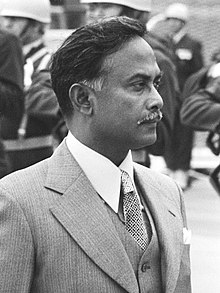Ziaur Rahman
Ziaur Rahman ( Bengali : জিয়াউর রহমান , Jiẏāur Rahamān ; born January 19, 1936 in the village of Bagbari, Bogra , Bengal ; † May 30, 1981 in Chittagong ) was the sixth President of Bangladesh and the founder of the Bangladesh Nationalist Party . He was also called Zia and is also known by the honorary name Shahid (English: martyr ). His wife Khaleda Zia has been Prime Minister of Bangladesh three times.
biography
His father, Mansur Rahman, was a chemist who worked for a government department in Kolkata . Zia's childhood was divided between life in the village and in the city. He later went to the Hare School in Calcutta.
At the beginning of the Bangladesh war , the army unit in which Zia was an officer captured the radio station in Kalurghat and declared Bangladesh's independence on behalf of Mujibur Rahman . As a war hero, Zia was awarded the Order of Bir Uttom in 1972. After Rahman was assassinated in 1975, Khondaker Mostaq Ahmad was made president and Zia was appointed chief of staff of the army . After another coup, Zia was placed under house arrest in November 1975. However, with the help of Colonel Abu Taher, he was able to carry out a successful counter-coup and became army chief again.
He declared himself president in 1977 and won a referendum held in 1978. In 1978 he founded the Bangladesh Nationalist Party and won widespread popular support for his stabilization policy. His policy was aimed at the introduction of a market economy system and industrial development. He also enshrined Islam in the constitution of Bangladesh and sought reconciliation with the Islamic parties that had fought on Pakistan's side . In terms of foreign policy, he gave up close ties to India and sought closer contacts with the Islamic and Western states.
Zia was murdered in a failed military coup in 1981.
literature
- Zia-ur-Rahman , in: Internationales Biographisches Archiv 46/1981 of November 2, 1981, in the Munzinger Archive ( beginning of article freely available)
Web links
- Ziaur Rahman in the nndb (English)
| personal data | |
|---|---|
| SURNAME | Rahman, Ziaur |
| BRIEF DESCRIPTION | Bangladeshi President |
| DATE OF BIRTH | January 19, 1936 |
| PLACE OF BIRTH | Bogra |
| DATE OF DEATH | May 30, 1981 |
| Place of death | Chittagong |

